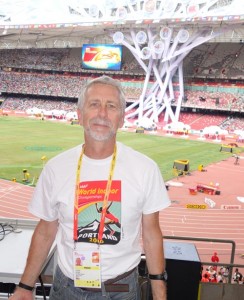
By Steve Ritchie
On my fourth day in Beijing, I got a call quite early in the morning. Still jet-lagged, I reached for the phone and answered groggily.
“Hello.”
“Good morning Mr. Ritchie. This is Su Ling from the front desk. We just wanted to wish you a happy birthday, and see when we could deliver a birthday cake to your room.”
Say what? I tried to shake off the mental rust and respond. Later that day I received a small birthday cake piled high with grapes, melon and kiwi.
That surprising gesture captured the tenor of so many of my interactions with people I encountered in Beijing. Now on my fifth day here to cover the IAAF World Track & Field Championships, I have not yet experienced any rudeness or hostility or aggressive selling tactics in any of my contacts with the locals. Just the opposite, actually.
One day on the crowded subway, several people, including a couple of middle-aged women, offered to give up their seats to me.
When I arrived at the airport last week, the first thing I did was check in at the World Championships help desk to see if I could get a shuttle to my hotel. The young volunteer there not only called the driver and showed me where to go, but stayed with me until he arrived.’
When I thanked her for her kindness, she said to me, “It is my honor.”
Wow. I think that people in Oregon are generally friendly and polite, but I have never received that response before.
Steve Ritchie covered the 2015 IAAF World Championships
in Track and Field for The Oregonian, Statesman Journal
and Bend Bulletin from Aug. 22-30. He also wrote about
his adventure for Our Town. The championships were held
at the “Birds Nest,” the main site of the 2008 Olympics
in Beijing.
Ritchie has been a freelance writer since 2004, and has
attended and written about three World Championships
(Moscow, 2013; Daegu, South Korea, 2011; Berlin, 2009),
as well as three Olympic Trials and numerous national
championships.
In June, Ritchie became the first recipient of the
James O. Dunaway Memorial Award for excellence in
track and field journalism, presented by the Track
and Field Writers of America. James Dunaway was a
freelance journalist who covered track and field for
more than 50 years. Dunaway passed away earlier
this year.
Beijing itself, like many of the world’s major cities that I have been to, is historic, sprawling, crowded, hot, smoggy (unbearably so on some days), fascinating, confusing, expensive and, in general, a blast to visit. But it’s always the quality of your encounters that seems to make the difference between a great trip and a so-so trip.
My friend and fellow journalist Xin Li had offered to show me around Beijing when I arrived. However, she was assigned to cover a major chess tournament outside Beijing and was gone for several days. So she arranged for her friends Ranran Feng and Shuyu Li to take me out to dinner at a traditional Chinese restaurant one evening.
I met the two young ladies and enjoyed a lavish meal and great conversation. Though we were total strangers, they were so friendly and funny that we spent most of the time laughing together.
Ranran and Shuyu are both from a province in the south of China and they told me that people, especially young people, from all over the country flock to the large cities like Beijing and Shanghai for the greater opportunities for work as well as socially. The influx of young people helps make these cities vibrant, energetic places.

Championships in China.
One evening I went on my own to the Nan Luo Gu Xiang district of Beijing, a historic neighborhood called a Hutong. It combines traditional homes, which are still occupied, alleys and courtyards that date more than seven centuries, with bustling lanes of cafes, boutique shops, galleries, and nightlife. Many cities have such areas, but not as ancient and with as distinctive architecture. A car-free zone, mostly, this hutong covered several square miles and the main lanes were so densely packed with people it was like the state fair in the old days.
However, China is also a land of contrasts, and perplexing things. I began to keep a mental list of questions that came to me, some trivial, some important. Here’s a portion of my list:
Why is toilet paper used in restrooms for drying your hands?
Why do the automatic urinals flush when you first stand in front of them rather than when you leave?
Why can’t an incredibly tech-savvy country like China figure out how to deliver consistent Internet and wifi service for an event that has over 2,000 media folks who depend on that service?
Why are many signs in Chinese and English since there are few native English speakers in the country (not that I’m complaining about that)?
Why are young people required to hold signs at the stadium for hours in the broiling sun that point to seating sections, when the signs could just be attached to a post or put on a wall? Why does the Chinese government block access to so many websites – social media, news and information sites?
This latter question was of particular importance to me, as I and other journalists here had to access these websites to do our job. Many Chinese are also frustrated by this, I found, but there is little they can do to change it and seem resigned to it. Many people pointed out to me, though, that the president of China has a Facebook page. Of course, they found this ironic, funny and somewhat infuriating.
The “Great Firewall of China,” as it is known, can be circumvented with a VPN, or virtual private network which can be easily purchased in the states. The one I purchased, however, worked not at all in China. Fortunately, a person I sought help from whipped out a thumb drive, plugged it into my laptop and installed a Chinese VPN on my laptop without even consulting me about what he was doing. God bless him, I couldn’t have survived without that.